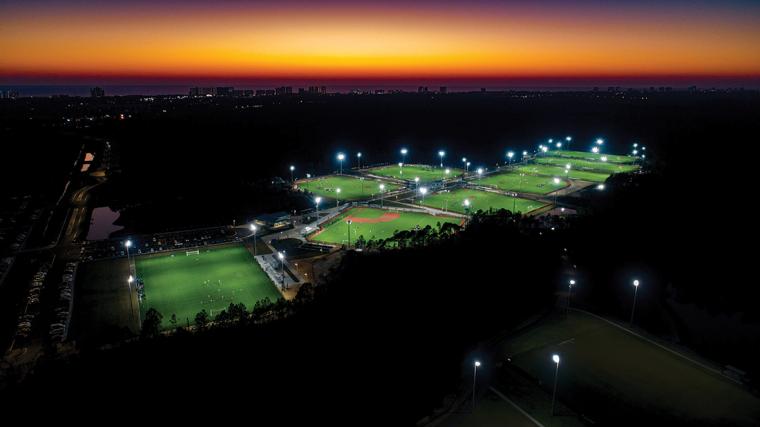
The term “win-win,” while cliché, is rooted in truth. In any negotiation scenario from business acquisitions to getting your child to brush their teeth before going to bed, getting to a situation where both parties are comfortable with the outcome of the discussion is the ultimate goal. Negotiating with facility vendors is no different.
Event rights holders are looking to achieve revenue goals, bolster their reputation and provide a superior guest experience by hosting events at a given venue. The venues, for their part, are looking for event content that supports their goals, whether it’s driving economic impact, generating revenue or providing programming for residents. What lies between these intentions are numerous discussions designed to build rapport, develop trust, and produce an actionable plan that gets both parties to the shared goal: The “win-win.”
While that sounds simple, it’s not easy. The number of venues has risen sharply over the last five years, but so has the competition. Pent-up demand for events in a post-COVID world has made it more challenging than ever to stand out, especially when working with the top sports, recreation and events facilities that may already have established relationships with well-known events.
The following advice comes from facility operators around the nation. Below you’ll find guidance on what venues look for in events, what helps rights holders stand out and become great partners, and reputation-damaging red flags to avoid, among other items.
Before the Negotiation

It all starts with goals, both yours and those of your potential venue partner. All success starts with how you define it. Being clear on your financial and attendance goals is critical for framing your venue size and location needs as well as the type of amenities you want the venue to offer. Knowing a facility’s goals is essential. Oftentimes, venues have partners whose goals you must consider as well.
“In Panama City, we’re partners with the Convention and Visitors Bureau, and with any event that we plan here, we look for it to meet both the facility’s goals and the Convention and Visitors Bureau’s goals. And for them, the economic impact is important,” said Mike Higgins, general manager of Publix Sports Park, a sports tourism-focused venue that has driven $170 million in economic impact to the city since 2019.
While some venues are driven by economic impact goals, others are driven by revenue goals. Facilities are also looking for programming to enhance the quality of life of residents, while others seek some combination of all these goals. This makes doing your homework crucial to the negotiation process.
The Discovery Process
While researching the potential venue partner is important and should includes Google searches, reading previous Sports Destinations Management articles, reviewing information from an industry association such as the U.S. Indoor Sports Association, and contacting event rights holders tha have partnered with the venue in the past.
It’s also important to get in front of the facility vendor and ask great questions. Cole Lacey, vice president of venue management for the Sports Facilities Companies, said that early in the partnership process, rights holders should ask what services the venue will provide. This question will not only offer insight into what the event rights holder’s process should be onsite, but it will also inform them of the value they will receive for their rental fee. This is especially important when pursuing venues with higher fees.
While a larger investment may be a turn-off initially, the fee may indicate a more inclusive partnership experience from the facility. Some venues may support events by offering athletic trainers, scoreboard operators, referees, or security staff. Other venues may provide a stage and other specialized equipment to elevate the perception of the event. Understanding what the facility is willing to provide will help you determine your own budget and production needs.
Lacey also noted several other items that rights holders should ask about beforehand to gain insight on how the venue may support the event experience. “A rights holder will want to know the sizes and specifications of the facility, in-facility and local food options, lodging accommodations, parking proximity and capacity, as well as local activities available for adults and families…They may also want to ask about transportation options to local attractions.”
Higgins said that it is also important for rights holders to ask about and understand their pain points. “I think if they come into it with a professional mindset and try to empathize with what the facility and the staff are going through, they have a great chance to connect and become a great partner.”
What Facility Vendors Want to Know
Facility vendors will also be doing homework on their potential event partners. This includes seeking references from venues that you’ve worked with previously. In their research, they are looking for insight into the quality of partnership that you’ve provided in the past. Some of the questions facility vendors are seeking answers to include:
• How many teams/participants have your events included?
• What are your expectations of the facility?
• How many spectators do you expect?
• Does your event drive concession sals?
• What is the format of the event?
• Have your events caused damage to a venue?
The last question is an important one. “You want to partner with a rights holder that’s going to come into that facility and take care of it as if it was their own and make sure that it’s left the way they found it,” said Lacey.
What Makes Your Event a Great Partner?
Higgins and Lacey noted several items that are key to building strong partnerships:
Accurate Forecasting
First and foremost, facility vendors want to know if you met your goals in terms of teams and attendance. This question speaks to your ability to meet expectations rather than producing an event that draws large numbers of participants and guests.
Professionalism
A high level of professionalism onsite is critical as well, according to Higgins. “Were they there on time to set up when we scheduled staff to be there, or do we have to reschedule staff?”
Long-Term Partnerships
Facility vendors look for event partners that can build long-term relationships with their venue. And this may be a point of leverage for the event rights holder. Your willingness to produce events over multiple years can increase your attractiveness as a partner. “Whether it’s an event that stays for a lifetime or one that’s around for three years, the common goal is to find ones that provide mutual, long-term benefits,” said Lacey.
Connecting with the Surrounding Community
Facility vendors with economic impact goals want to know if you are integrating community amenities into the event experience. “Are they bringing additional stuff to the community? Are they tapping into some of the amenities that are offered in the city such as an amusement park, a beach, or a boardwalk?” asks Lacey.
Ripken Baseball, an event partner of venues throughout the country, puts this into practice by setting up opportunities in their tournament schedule for athletes and their families to be able to experience host destinations.
“Many of the families of the teams that come here are using these events as vacations, so this helps make for a greater experience,” said Higgins
Avoid Red Flags

Both Lacey and Higgins expressed that there are several actions (and non-actions) that event rights holders have taken that have greatly damaged their chances of working with their venues. Most are easy to avoid, but in the hurried process of producing events, they can also be easy to forget.
“Using a beach analogy, we have the red flags and the double red flags. First and foremost is accessibility. When we call to seek information, are you accessible? Are you getting back to us?” said Higgins. He noted that it could be a sign that an event is not living up to expectations about the number of teams they expect to bring.
Higgins adds, “We look at whether the rights holders understand our rules and if their vendors understand our rules. Those are the types of things that, if they don’t go the right way, make the partner a more challenging one to work with.”
The Power of Being Upfront
While we all want to present all the reasons why our events are a great fit for a facility partner, real trust can be built by presenting your shortcomings as well. While it can be painful to discuss a detail that didn’t go as planned in an event, consider this.
Most venues will be thorough when researching the performance of your events. Thus, they are likely to learn about any issues that you’ve had anyway. Being upfront allows you to control the narrative around any issues that you’ve dealt with during previous events.
Scheduling as a Weapon
If you are willing to be flexible with the date of your event, you become a more viable partner when negotiating with facility vendors. Each venue has “non-premium” weekends and weekends during shoulder and off seasons that they are looking to fill up. Facility vendors are eager to fill these spaces with quality event content.
Some facilities may provide significantly reduced rental fees for booking during Non-Peak periods. Even more importantly, by solving an issue for the facility vendor, you build a relationship with them. That investment may pay off with more desirable dates in the future.
Ask About Incentives
Since events play such a key role in driving an economic impact for many communities, there are a variety of incentives available for supporting their goals.
Higgins expressed the importance of talking with the venue’s destination marketing partner while building the partnership with facility leadership to understand what opportunities may exist.
A Win-Win for All Parties
The common thread that weaves its way throughout this advice is the idea that working with facility vendors, at its best, is more of a partnership than a transaction. Sure, you may be paying a fee to use the venue, but when you understand their goals and pain points, and position your event as a tool to support their work, you in turn receive the resources needed to bolster your efforts. While this process takes more time, the results often translate into a superior experience for attendees, which, at the end of the day, is what we all want: A win-win. SDM

